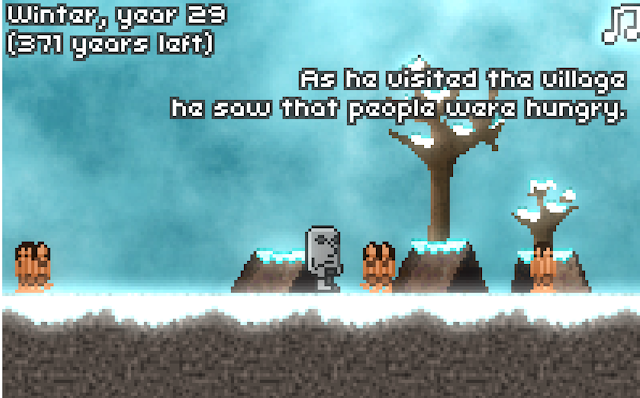Thoughtful and methodical, 400 Years is a humble Flash game with bold ideas. You play as a sort of living stone face (think pixel art Easter Island statue). You move through the 2D world, as one does in a platformer, only, instead of giving you a jump command, pressing the space bar advances time, season by season.
You have precisely 400 years (with four seasons each), to reach the end of the game.
– – –
To accomplish this, you must make clever use of your time-advancing abilities. In winter, water freezes, allowing you to walk across ponds and lakes. If you plant seeds, trees grow, allowing you to climb them to higher ground. And if you feed hungry villagers along the way, they just might advance as a civilization and build you bridges across impossible chasms.
The puzzles are simple, requiring just your brain – primarily your ability to work out the order of operations of various tasks, and nary a reflex. It’s a slow-paced, cerebral experience, and a very calm one. The atmosphere is chilled out and meditative – each season comes alive with gorgeous pixel art, from vibrant autumnal colors in the fall to tufts of blocky snow in the winter scenes to the glistening blue of the various bodies of water.
Even the music and your character’s plodding pace entreat the player to calm down, take a look around, and think about your next few actions.
In fact, the only thing that happens quickly is the passage of time (when you use your power). Hold the spacebar long enough, and years will fly by in seconds, the seasons flickering in and out wildly. It’s a powerful rush – especially given your time limit.
Speaking of, unless you needlessly waste precious time (or become so intoxicated by the effect that you do so), the 400-year hard stop isn’t really a problem. I had a solid 200+ years left when I reached the end, and I did plenty of experimenting with various solutions.
Even the ending offers a poignant little moment, encapsulating the feel of the game. Designer ScriptWelder has crafted a tiny masterpiece here – it’s humble, brief, and quietly joyful throughout.
